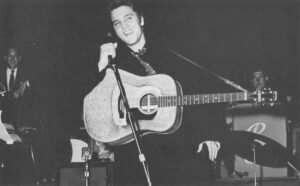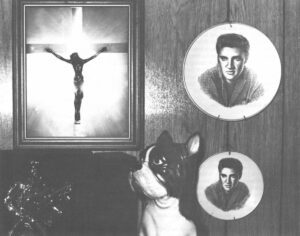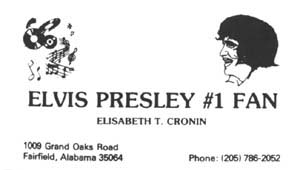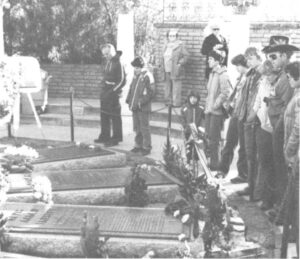Elizabeth Kaye
- 1981

Fellowship Title:
- The Phenomenon of Elvis Presley in American Life
Fellowship Year:
- 1981

No Happy Elvis Stories
MEMPHIS, Tenn.–The woman is an Elvis fan from Boston. She is in her mid-thirties, has dark hair, and is thin, in that pale, pinched way that comes with being nervous. At the moment she is listening to one of the many Memphis men who dyes his hair the color of Elvis’s, wears Elvis style sunglasses, drives the inevitable Cadillac, and claims to have been well-acquainted with Elvis Presley, but wasn’t. He is recounting a few all too familiar tales, stories of the King of Rock and Roll, who escaped the poor boy’s trap of anonymity and hopelessness he was born to, and lived out the promises of the American Dream, only to discover that an equally rigid entrapment exists in the fame, wealth, and power that Americans have historically equated with being free. But now the man in Memphis talks of Elvis Presley in the most pejorative way, and the agitation of the Boston fan manifests first in her fluttering hands, then in her eyes, and then in tears. He talks on. She covers her

Religious Relics of Rock & Roll
MEMPHIS, Tenn.–They approach the grave in silence. A few yards from the gravesite they extinguish cigarettes in a foot-high bucket crammed with paper cups from MacDonalds, empty boxes of film, and Whattaburger wrappers. They leave a flower or a bouquet. They say a prayer. On the way back down the hill many ask questions of the guards. How long did he live here? How many rooms in the house? Is that his horse, Rising Sun, in the yard? And still there are those who want to know: Is he really dead? Did he really die? It is August once again in Memphis, Tennessee. Now Elvis Presley is four years dead, and the faithful come, as they come each year, to the grave of the man they adore. “One wonders why,” writes a columnist in a Memphis paper. “Ask why I’m here,” says a woman from Milwaukee. “I’ll tell you I don’t know.” Part of the answer can be found in a precedent that grows increasingly clear, for the King of Rock and Roll has come

Idoling Elvis
MEMPHIS, Tenn.–In 1954 Elvis Presley came to be known as the King of Western Bop. He was the white boy who “sang black,” the revolutionary, rockabilly cat whose body movements originated from the wild contortions of Southern preachers. He was lusty and evangelical, a combination of Valentino and Jesus. If his soft face and body made men uneasy, striking them as feminine and offensive, those same physical attributes devastated women; Elvis’s sexual appeal was his androgeny. Elvis was a predatory male, who could sing “Baby Let’s Play House” with a voice filled with lascivious suggestion. But he could also sing “Love Me Tender,” and reveal a sweetness and a vulnerable heart, attributes more frequently associated with women. Elvis was as good as he was bad; he might do a girl wrong, but he would be so sorry. He radiated what e.e. cummings once called “an intense fragility” and from that tension came his power and sexuality. To respond to him was to respond to sheer, raw sex. And had sexual obsession been an acceptable state

Elvis is Watching Us: Studying an American Dream
MEMPHIS, Tenn.–There is a small black camera on the lawn of Graceland, where Elvis Aron Presley, King of Rock and Roll, once lived, then existed, and finally died. The camera points at Graceland’s green and white wrought iron gate. At one time it transmitted to the bedroom that belonged to Elvis Presley. In this way he could watch the fans who were compelled to stand at his gate, should he wish to. These were men and women who came to the gate in groups of two’s, and three’s, and four’s; men and women who think of themselves less as workers, mates, and parents than as Elvis fans. Their allegiance to that self-definition became a twenty-four hour vigil at the gate, for virtually all the days and all the nights of each of the twenty years that Elvis Presley lived cloistered within it. Across the street from the Graceland gate, one hundred yards up the boulevard named for Elvis Presley, there is a small, all-night cafe called The Hickory Log. It is here that Elvis fans
